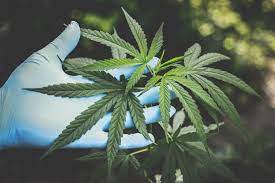The term “medical cannabis” describes the use of the cannabis plant or any of its chemical components as a prescribed medication or herbal remedy. This type of medication can be administered in various ways, including capsules, lozenges, tinctures, dermal patches, oral or dermal sprays, and cannabis edibles, among others. It is often used to treat several ailments, such as pain, nausea, and loss of appetite.
The use of medical cannabis is debatable, and different jurisdictions have different laws governing its availability and legality. Many countries are progressively implementing the use of medical marijuana for the mentioned conditions, which is bolstering the medical cannabis market forecast, globally.
In this article, we’ll learn about how medical cannabis works, its advantages, and its disadvantages.
How Does Medical Cannabis Work?
Cannabis can have many effects on our bodies. It can be consumed in various forms, including smoked, vaporised, eaten, and taken as a liquid extract. Cannabinoids, the active ingredients found in cannabis, are the main chemicals that trigger various effects in our bodies. There are two common cannabinoids that can be found in cannabis-based products:
THC (tetrahydrocannabinol) and CBD (cannabidiol). THC is the ingredient responsible for the intoxicating effect of the cannabis product. It is the main psychoactive compound found in marijuana that makes people “high”. CBD is the nonintoxicating compound found in marijuana.
Both can be used for medical purposes. THC has the potential to affect medical conditions such as pain, nausea, reduced appetite, and insomnia, among others, while CBD can have medicinal effects on conditions such as epilepsy and anxiety.
There are many states in the United States and countries around the world where the use of cannabis for medical purposes is being legalised. The legal cannabis market has grown significantly owing to the increasing use and acceptance of medical cannabis.
What are the Benefits and Risks of Medical Cannabis?
Although people are still sceptical about the use of cannabis for medical applications, several research studies have demonstrated that the use of medical cannabis can be beneficial in the treatment of certain conditions.
Benefits of Medical Cannabis
Chronic Pain
Chronic pain is different from other types of body pain as it persists for a longer period and can occur alongside a chronic health condition, such as arthritis. With numerous studies conducted on the use of medical cannabis, researchers found a common point.
Cannabis or medications containing cannabinoids can provide relief from chronic pain by acting on brain receptors. It stimulates the brain’s reward system and reduces the pain.
Many states in the United States have legalised the use of medical cannabis for chronic pain. However, it brings additional challenges for patients and medical organisations because recreational and medicinal cannabis is irresponsibly overlapping. Do note that recreational cannabis contains much higher levels of active ingredients.
Cancer
Several studies linked to the treatment of cancer have emphasised on the role of cannabinoids in either slowing down the growth of cancer cells or killing them. Oral cannabinoids have proved their effectiveness against nausea and vomiting caused by chemotherapy, and evidence suggests that smoked cannabis may aid in alleviating certain side effects associated with chemotherapy. However, it is worth noting that while cannabinoids are a safe treatment option, they are not effective at controlling or curing cancer.
Depression and Post-Traumatic Stress Disorder (PTSD)
In the investigations done by several medical institutions, evidence was found that the use of medical cannabis can provide short-term relief from depression and post-traumatic stress disorder symptoms.
However, it is discovered that the majority of publications are correlational and observational, with a noteworthy absence of randomised and regulated studies.
Epilepsy
CBD-based medication has proven to be effective in the treatment of epilepsy, and the Food and Drug Administration (FDA) has given their approval for the use of a medication containing cannabidiol (CBD) to treat conditions such as Lennox-Gastaut syndrome and Dravet syndrome.
The first CBD-based medication approved by the administration is known as Epidiolex, and it is approved for the treatment of seizures in people with Dravet syndrome and Lennox-Gastaut syndrome. Later, in 2020, Epidiolex was also approved as a medication for seizures in people affected by tuberous sclerosis complex (TSC).
However, the test of CBD on affected children shows that the number of seizures experienced per month increased by a significant percentage. Moreover, the children receiving treatment with CBD also started experiencing side effects such as vomiting, fatigue, and fever.
The advertising paper for Epidiolex also has a warning of serious side effects such as liver damage, sedation, and even thoughts of suicide.
It is indicative that medical cannabis is still at the exploratory research stage, and certain risks are also associated with its usage, which brings us to our next point.
Risks of Medical Cannabis
With the benefits, research studies have also shown a lot of drawbacks related to the administration of medical cannabis.
Mental Health Problems
Regular cannabis use is likely to exacerbate bipolar disorder symptoms in people who already have them. There is evidence that suggests that regular cannabis users are somewhat more likely to experience depression and suicidal thoughts. Cannabis use is considered to increase the risk of psychoses, including schizophrenia. It has also been stated that several other mental health illnesses, such as psychosis, should not be treated with cannabis.
Respiratory Issues
It is “uncertain” if frequent cannabis use can affect lung function or increase the chance of developing chronic obstructive pulmonary disease or asthma. However, consistent cannabis use is linked to a higher risk of chronic cough. Medical cannabis will likely not harm the patient’s respiratory system; however, it’s necessary to specify the dosage limit. Recreational usage should be avoided as it is completely different from medical use.
In Conclusion
Studies have been conducted to evaluate both the harmful and beneficial effects of cannabis on health. But despite the publication of incredibly extensive summaries of the scientific studies analyzing the drug’s advantages and risks, it is clear that more research is needed to fully understand the effects of greater cannabis use on public health.
Many healthcare institutes, medical professionals, and scientists support the idea that there is a need for further focus on scientific research on the effects of cannabis for medical treatment.





